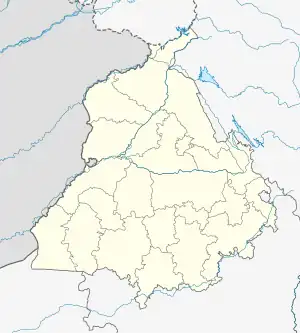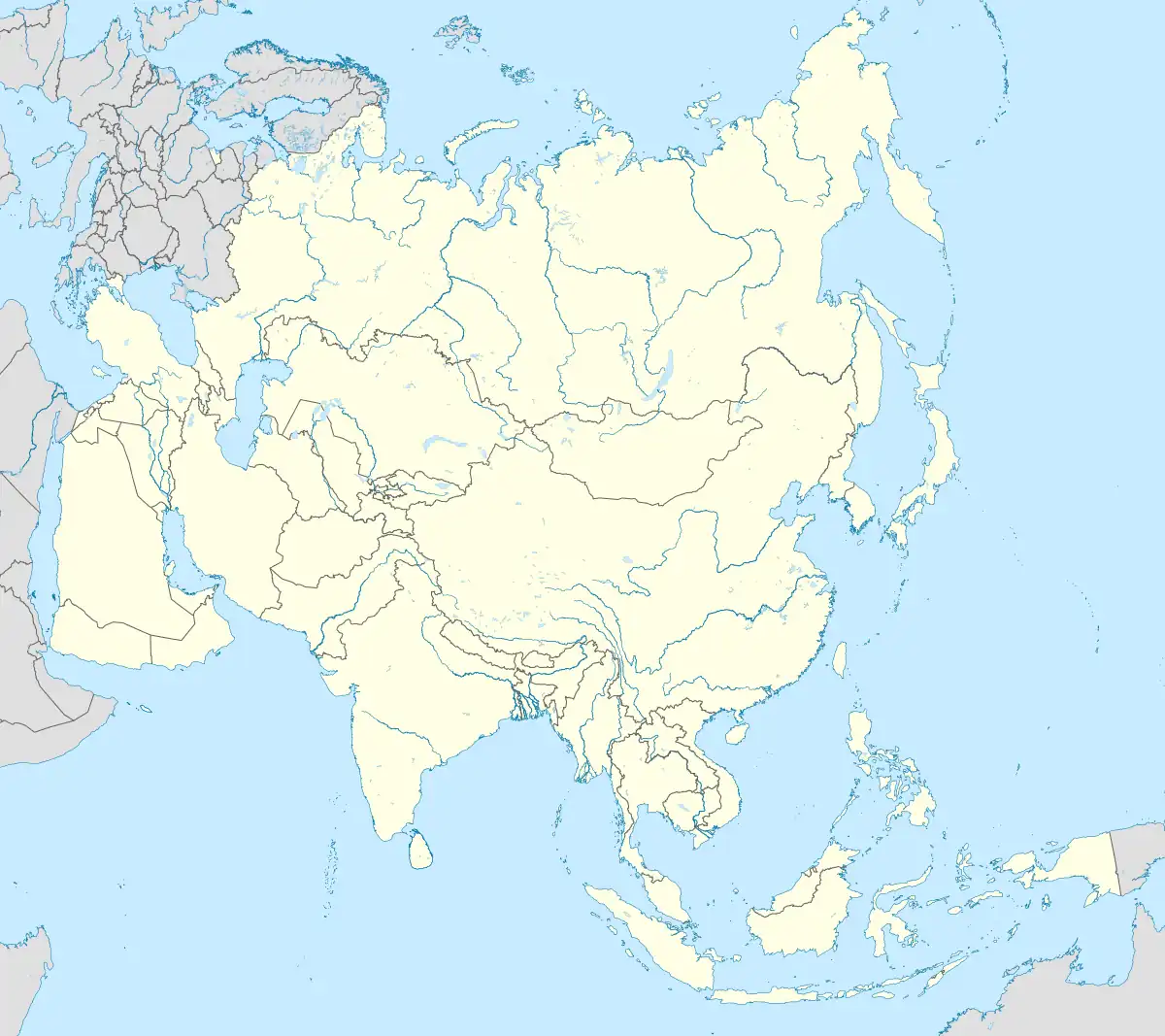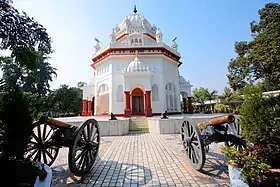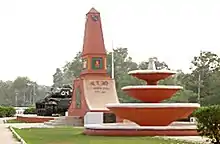Firozpur | |
|---|---|
City | |
Clockwise from top: Saragarhi Memorial in Firozpur, Shaheed Bhagat Singh Stadium, The Barki Memorial | |
 Firozpur Location in Punjab, India  Firozpur Firozpur (India)  Firozpur Firozpur (Asia) | |
| Coordinates: 30°55′00″N 74°36′00″E / 30.9166°N 74.6°E | |
| Country | |
| State | Punjab |
| District | Firozpur |
| Founded by | Firoz Shah Tughluq |
| Named for | Firoz Shah Tughluq |
| Government | |
| • Member of Parliament | Sukhbir Singh Badal (SAD) |
| • Member of the Legislative Assembly (Urban) | Ranbir Singh Bhullar(AAP) |
| • Member of the Legislative Assembly (Rural) | Rajnish Dahiya (AAP)[1] |
| Elevation | 182 m (597 ft) |
| Population (2011)[2] | |
| • Total | 110,313 |
| • Density | 380/km2 (1,000/sq mi) |
| Demonym(s) | Firozpuri, Firozpuria |
| Languages | |
| • Official | Punjabi[3] |
| Time zone | UTC+5:30 (IST) |
| PIN | 152001 |
| UNLOCODE | IN FIR |
| Area code | 91-1632 |
| Vehicle registration | PB-05 |
| Literacy | 70.7% |
| Lok Sabha constituency | Firozpur |
| Vidhan Sabha constituency | Firozpur city |
| Planning agency | PUDA |
| Major Highways | NH95 SH15 SH 20 |
| Climate | BSh (Köppen) |
| Avg. summer temperature | 29.7 °C (85.5 °F) |
| Avg. winter temperature | 16.9 °C (62.4 °F) |
| Precipitation | 731.6 millimetres (28.80 in) |
| Website | ferozepur |
Firozpur, (pronunciation: [fɪroːzpʊr]) also known as Ferozepur,[4] is a city on the banks of the Sutlej River in Firozpur District, Punjab, India. After the partition of India in 1947, it became a border town on the India–Pakistan border with memorials to soldiers who died fighting for India.[5]
History

The city of Firozpur was founded by Firuz Shah Tughlaq, a ruler of the Tughluq dynasty, who reigned over the Sultanate of Delhi from 1351 to 1388.[6] It is located on the banks of the Sutlej River on the India–Pakistan border. The nearby Firozpur Cantonment is a major cantonment of the country.
British rule was first established in 1835, when, on the failure of heirs to the Sikh family who possessed it, a small escheat to the British government was formed, and the district was gradually formed around this nucleus. The strategic importance of Ferozepur (as it was spelled under the British) was at this time very great, and in 1839 it was the outpost of British India in the direction of the Sikh power. It accordingly became the scene of operations during the First Anglo-Sikh War, in which the Sikhs crossed the Sutlej in December 1845, but were defeated and withdrew into their own territory, and peace was concluded with the Treaty of Lahore. Later, throughout the Indian Mutiny Ferozepur remained in the hands of the English.[7]
The Saragarhi Memorial Gurudwara commemorates 21 Sikh soldiers of the 36th Sikh Regiment who died in the Battle of Saragarhi, defending the Saragarhi Fort against an overwhelming enemy force of 10,000 Pathan tribesmen on 12 September 1897.[8][9][10] All of the 21 soldiers were awarded the Indian Order of Merit posthumously.[8][9]
The Barki Memorial, built in 1969, is a memorial to the soldiers of the 7 Infantry Division who died in a battle in 1965 which led to India taking the town of Barki, 15 miles south-east of Lahore.[11]
Geography
Climate
| Climate data for Firozpur | |||||||||||||
|---|---|---|---|---|---|---|---|---|---|---|---|---|---|
| Month | Jan | Feb | Mar | Apr | May | Jun | Jul | Aug | Sep | Oct | Nov | Dec | Year |
| Mean daily maximum °C (°F) | 19 (66) |
21 (69) |
26 (78) |
34 (94) |
38 (101) |
39 (103) |
34 (94) |
33 (91) |
33 (92) |
32 (89) |
26 (79) |
21 (69) |
30 (85) |
| Mean daily minimum °C (°F) | 7 (44) |
8 (47) |
13 (55) |
18 (65) |
23 (73) |
26 (79) |
26 (79) |
24 (76) |
23 (74) |
17 (63) |
11 (52) |
7 (45) |
17 (63) |
| Average precipitation mm (inches) | 20 (0.80) |
38 (1.50) |
30 (1.20) |
20 (0.80) |
20 (0.80) |
61 (2.40) |
229 (9.00) |
188 (7.40) |
86 (3.40) |
5.1 (0.20) |
13 (0.50) |
20 (0.80) |
730.1 (28.8) |
| Source: [12] | |||||||||||||
Demographics
As of the 2011 Indian Census, Firozpur had a total population of 110,313, of which 58,451 (53%) were male and 51,862 (47%) were female. 10.6% of the population was six years old or younger. The total number of literate people in Firozpur was 78,040, which constituted 70.7% of the population, with male literacy of 73.3% and female literacy of 67.9%. The effective literacy rate (population of 7 years and above) was 79.1%, of which the male literacy rate was 82.3% and female literacy rate was 75.6%. The Scheduled Caste population was 27,395. Firozpur had 22,263 households in 2011.[2]
Religion
According to the 2011 census, out of a total population of 110,313 in Firozpur city, Hinduism is followed by 77,743 (70.5%) people and Sikhism by 28,961 (26.3%). Minorities religions include Christianity, Islam, Jainism, and Buddhism.[13]
| Religious group |
1881[15][16]: 520 | 1891[17]: 68 | 1901[18]: 44 | 1911[19]: 20 | 1921[20]: 23 | 1931[21]: 26 | 1941[14]: 32 | 2011 | ||||||||
|---|---|---|---|---|---|---|---|---|---|---|---|---|---|---|---|---|
| Pop. | % | Pop. | % | Pop. | % | Pop. | % | Pop. | % | Pop. | % | Pop. | % | Pop. | % | |
| Hinduism |
19,004 | 48.03% | 23,047 | 45.69% | 21,304 | 43.18% | 21,542 | 42.38% | 24,525 | 45.12% | 28,253[lower-alpha 2] | 43.71% | 34,543[lower-alpha 2] | 41.87% | 77,743 | 70.47% |
| Islam |
17,609 | 44.5% | 22,018 | 43.65% | 24,314 | 49.28% | 23,409 | 46.05% | 24,456 | 45% | 28,464 | 44.04% | 38,390 | 46.53% | 342 | 0.31% |
| Sikhism |
1,207 | 3.05% | 3,387 | 6.72% | 1,635 | 3.31% | 2,951 | 5.8% | 3,025 | 5.57% | 4,439 | 6.87% | 6,457 | 7.83% | 28,961 | 26.25% |
| Jainism |
72 | 0.18% | 407 | 0.81% | 301 | 0.61% | 479 | 0.94% | 476 | 0.88% | 511 | 0.79% | 630 | 0.76% | 148 | 0.13% |
| Christianity |
— | — | 1,561 | 3.09% | 1,753 | 3.55% | 2,439 | 4.8% | 1,855 | 3.41% | 2,942 | 4.55% | 1,533 | 1.86% | 2,591 | 2.35% |
| Zoroastrianism |
— | — | 15 | 0.03% | 4 | 0.01% | 16 | 0.03% | 14 | 0.03% | 24 | 0.04% | — | — | — | — |
| Buddhism |
— | — | 0 | 0% | 0 | 0% | 0 | 0% | 0 | 0% | 1 | 0% | — | — | 43 | 0.04% |
| Others | 1,678 | 4.24% | 2 | 0% | 0 | 0% | 0 | 0% | 0 | 0% | 0 | 0% | 949 | 1.15% | 485 | 0.44% |
| Total population | 39,570 | 100% | 50,437 | 100% | 49,341 | 100% | 50,836 | 100% | 54,351 | 100% | 64,634 | 100% | 82,502 | 100% | 110,313 | 100% |
Media
Firozpur has an All India Radio Relay station known as Akashvani Firozpur. It broadcasts on 100.1 MHz frequency.
Notable people
- Susham Bedi, author
- Preet Bharara, attorney and media personality
- George Bigge, cricketer
- Lawrence Bishnoi, an Indian gangster
- Alexander Cadell, cricketer
- Sohraab Dhaliwal, cricketer
- Horatio Dumbleton, cricketer
- Sher Singh Ghubaya, politician
- Annie Gill, actress
- Balram Jakhar, politician
- Charles Kindersley, cricketer
- Zora Singh Maan, politician
- Verma Malik, lyricist
- Narain Chand Parashar, politician
- Bano Qudsia, writer
- Janmeja Singh Sekhon, politician
- Ajit Pal Singh, hockey player
- Gagan Ajit Singh, hockey player
- Ganda Singh, revolutionary
- Gurbaj Singh, hockey player
- Princepal Singh, basketball player
- Ronjan Sodhi, shooter
- Manav Vij, actor
Notes
- ↑ 1881-1941: Data for the entirety of the town of Firozpur, which included Firozpur Municipality and Firozpur Cantonment.[14]: 32
- 1 2 1931-1941: Including Ad-Dharmis
- ↑ "Assembly elections 2017: Only 6 women legislators make entry into Punjab Assembly". Hindustan Times. Retrieved 31 January 2018.
- 1 2 "Census of India: Firozpur". censusindia.gov.in. Retrieved 2 January 2020.
- ↑ "52nd Report of the Commissioner for Linguistic Minorities in India" (PDF). Nclm.nic.in. Ministry of Minority Affairs. p. 32. Archived from the original (PDF) on 25 May 2017. Retrieved 30 August 2019.
- ↑ "District Ferozepur, Government of Punjab, India". Retrieved 7 August 2022.
- ↑ "Firozpur". Info Punjab. Retrieved 14 October 2006.
- ↑ Sen, Sailendra (2013). A Textbook of Medieval Indian History. Primus Books. p. 98. ISBN 978-9-38060-734-4.
- ↑ One or more of the preceding sentences incorporates text from a publication now in the public domain: Chisholm, Hugh, ed. (1911). "Ferozepur". Encyclopædia Britannica. Vol. 10 (11th ed.). Cambridge University Press. p. 281.
- 1 2 Kamal, Neel (11 September 2022). "125 years of Battle of Saragarhi: Tale of Sikh grit is heard from Punjab to United Kingdom". The Times of India. Retrieved 3 June 2023.
- 1 2 Panag, H. S. (28 March 2019). "What Akshay Kumar's Kesari won't tell you: The real military account of Battle of Saragarhi". ThePrint. Retrieved 3 June 2023.
- ↑ "Saragarih Memorial - Welcome to the official website of District Ferozepur, Punjab, India". Ferozepur.nic.in. Archived from the original on 18 January 2018. Retrieved 31 January 2018.
- ↑ "The Barki Memorial - Welcome to the official website of District Ferozepur, Punjab, India". Ferozepur.nic.in. Archived from the original on 10 February 2018. Retrieved 31 January 2018.
- ↑ "Average Weather for Firozpur - Temperature and Precipitation". The Weather Channel. Retrieved 25 February 2008.
- 1 2 "C-1 Population By Religious Community - Firozpur City". census.gov.in. Retrieved 29 June 2022.
- 1 2 "CENSUS OF INDIA, 1941 VOLUME VI PUNJAB". Retrieved 17 January 2023.
- ↑ "Census of India, 1881 Report on the Census of the Panjáb Taken on the 17th of February 1881, vol. I." 1881. JSTOR saoa.crl.25057656. Retrieved 14 January 2024.
- ↑ "Census of India, 1881 Report on the Census of the Panjáb Taken on the 17th of February 1881, vol. II". 1881. JSTOR saoa.crl.25057657. Retrieved 14 January 2024.
- ↑ "CENSUS OF INDIA, 1891 GENERAL TABLES BRITISH PROVINCES AND FEUDATORY STATES VOL I". Retrieved 17 January 2023.
- ↑ "CENSUS OF INDIA, 1901 VOLUME I-A INDIA PART II-TABLES". Retrieved 17 January 2023.
- ↑ "CENSUS OF INDIA, 1911 VOLUME XIV PUNJAB PART II TABLES". Retrieved 17 January 2023.
- ↑ "CENSUS OF INDIA, 1921 VOLUME XV PUNJAB AND DELHI PART II TABLES". Retrieved 17 January 2023.
- ↑ "CENSUS OF INDIA, 1931 VOLUME XVII PUNJAB PART II TABLES". Retrieved 17 January 2023.
External links
- . Encyclopedia Americana. 1920.
- Official website


